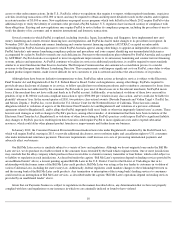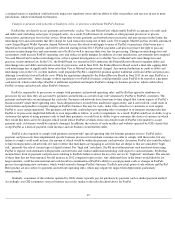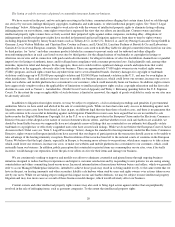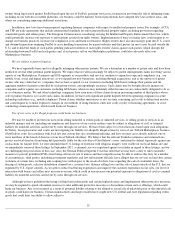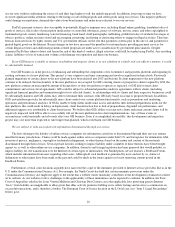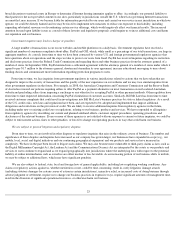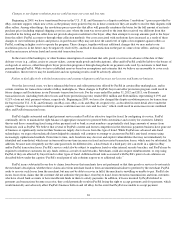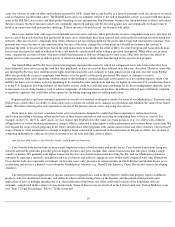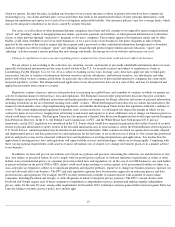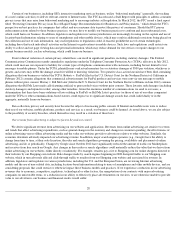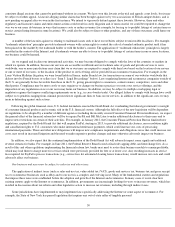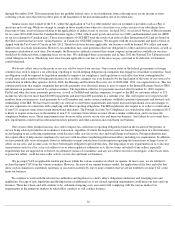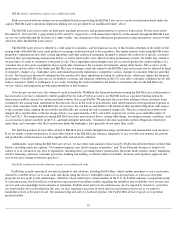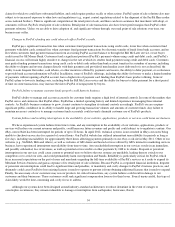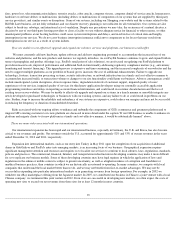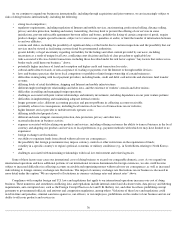eBay 2012 Annual Report Download - page 28
Download and view the complete annual report
Please find page 28 of the 2012 eBay annual report below. You can navigate through the pages in the report by either clicking on the pages listed below, or by using the keyword search tool below to find specific information within the annual report.
interpretation or application of such laws imposes restrictions on, or increases the costs of, purchasing, selling or shipping goods across national
borders, our business would be harmed. Any additional factors that increase the costs of purchasing, selling or shipping goods across national
borders or restrict, delay or make cross-border trade more difficult or impractical, including fluctuations in currency exchange rates, currency
restrictions, increases in delivery service rates or service terminations, disruptions or interruptions, import or export control laws, the application
of (or increases in) tariffs, duties or other taxes on imports or exports, customs enforcement (including delays at the border attributable to
customs inspections), enforcement of international intellectual property rights by rights holders or court rulings, or that otherwise result in a net
reduction in cross-border trade on our sites would lower our revenues and adversely affect our business. As part of our ongoing efforts to drive
more transactions and improve seller efficiency and buyer experience, we are evaluating opportunities to become more actively involved in
different aspects of cross-border transactions, which could potentially expose us to additional liability based upon the nature of our involvement
in aspects of such transactions and/or the actions of our users in one or more countries.
Our cross-border trade is also subject to, and may be impacted by, currency exchange rate fluctuations, as discussed under the caption “
We
are exposed to fluctuations in currency exchange rates and interest rates” above.
Our business is subject to online security risks, including security breaches.
Our businesses involve the storage and transmission of users' proprietary information, and security breaches could expose us to a risk of
loss or misuse of this information, litigation and potential liability. An increasing number of websites, including several other large Internet
companies, have disclosed breaches of their security, some of which have involved sophisticated and highly targeted attacks on portions of their
sites. Because the techniques used to obtain unauthorized access, disable or degrade service, or sabotage systems, change frequently and often
are not recognized until launched against a target, we may be unable to anticipate these techniques or to implement adequate preventative
measures. If an actual or perceived breach of our security occurs, public perception of the effectiveness of our security measures could be
harmed and we could lose users. A party that is able to circumvent our security measures could misappropriate our or our users' proprietary
information, cause interruption in our operations, damage our computers or those of our users, or otherwise damage our reputation and business.
Any compromise of our security could result in a violation of applicable privacy and other laws, significant legal and financial exposure, damage
to our reputation and a loss of confidence in our security measures, which could harm our business. Data security breaches may also result from
non-technical means, for example, actions by a suborned employee. GSI's clients also face similar risks of security breaches, and to the extent
that its clients are harmed as a result of a security breach, GSI's business would also be adversely affected.
A significant number of our users authorize us to bill their payment card accounts directly for all transaction fees charged by us. For
example, PayPal's users routinely provide payment card and other financial information, and GSI customers routinely provide payment card
information and other personally identifiable information which we maintain to facilitate the ease of future transactions. We rely on encryption
and authentication technology licensed from third parties to provide the security and authentication to effectively secure transmission of
confidential information, including customer payment card numbers. Advances in computer capabilities, new discoveries in the field of
cryptography or other developments may result in the technology used by us to protect transaction data being breached or compromised.
Financial services regulators in various jurisdictions, including the U.S. and the EU, have implemented or are considering proposals to impose
new authentication requirements on banks and payment processors intended to reduce online fraud (e.g., two-factor authentication to verify a
user's identity), which could impose significant costs on PayPal, require PayPal to change its business practices, make it more difficult for new
customers to join its network and reduce the ease of use of its products, which could harm PayPal's business.
Under payment card rules and our contracts with our card processors, if there is a breach of payment card information that we store, or that
is stored by PayPal's direct payment card processing customers, we could be liable to the payment card issuing banks for their cost of issuing
new cards and related expenses. In addition, if we fail to follow payment card industry security standards, even if customer information has not
been compromised, we could incur significant fines or lose our ability to give customers the option of using payment cards to fund their
payments or pay their fees. If we were unable to accept payment cards, our businesses would be seriously damaged.
Our servers are also vulnerable to computer viruses, physical or electronic break-ins and similar disruptions, and we have experienced
“denial-of-service” type attacks on our system that have, in certain instances, made all or portions of our websites unavailable for periods of
time. For example, in December 2010, PayPal was subject to a series of distributed “denial of service” attacks following PayPal's decision to
indefinitely restrict the account used by WikiLeaks due to an alleged violation of PayPal's Acceptable Use Policy. We may need to expend
significant resources to protect against security breaches or to address problems caused by breaches. These issues are likely to become more
difficult and costly as we expand the number of places
26




